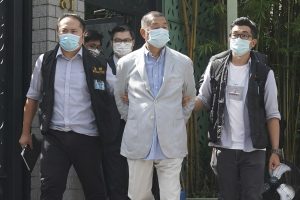On August 10, the Hong Kong Police Force arrested six persons on suspicion of violating the Hong Kong national security law (NSL). Among them were Jimmy Lai, the founder of Next Digital, which publishes the Hong Kong newspaper Apple Daily, and two of his associates. The others included Agnes Chow, co-leader of the disbanded youth political group Demosisto, and two other young people. All six were arrested on suspicion of “colluding with foreign elements to harm the security of the state.” According to the Hong Kong police, the three young people ran an organization that called on foreign countries and international organizations to sanction Hong Kong, while the Next Digital executives used foreign bank accounts to fund the organization.
However, details remain murky and many questions remain. For example, Chow stepped down from Demosisto before the NSL took effect, and Demosisto has also disbanded. A fluent Japanese speaker, Agnes Chow is well-known in Japan, where she has frequently appeared in the media seeking support for the pro-democracy movement in Hong Kong, although she has been largely inactive since the end of June. Assuming the NSL does not apply retroactively, what are the charges? According to Chow herself, the police told her that the issue was content she posted on social media in July, although they did not specifically indicate the problematic posts. There are no specific provisions in the NSL setting out what actions are sanctionable. Since the NSL took effect, the government of the Hong Kong Special Administrative Region has used this very ambiguity to issue warnings against a broad range of actions, pointing to the slogan “Liberate Hong Kong, revolution of our times” and the pro-democracy primaries ahead of the Election of the Legislative Council as possible contraventions of the NSL. The fact that it is not clear what constitutes a criminal act is ideal for those who are cracking down, and a source of great anxiety for those who are subject to the crackdown.
However, the political aim of the arrests is clear. For instance, Jimmy Lai’s Apple Daily is the only major newspaper in Hong Kong that clearly and harshly criticizes the Chinese government, and the government-controlled media in China have been fiercely hostile to Lai for many years.
The Chinese government has insisted that the NSL only punishes “very few people” and that the law is of no concern to 99.9 percent of the citizens. The aim of the drama surrounding the current arrests is to satisfy seething patriotic sentiment in mainland China by meting out severe punishment to individuals who have been portrayed as villains in the Chinese media in the past, while also cowing and demoralizing broad sections of the population with strict laws.
However, China will not achieve national security today or in the future with these methods. The more the Chinese government oppresses forces it does not like, the more it invites a national security crisis.
To begin with, China is wrong to identify Jimmy Lai or Agnes Chow as threats to national security. Apple Daily might be a major publication in Hong Kong, but for China it is a regional newspaper. Who will believe that the national security of a superpower like China could be shaken by criticism in a local paper? It is also hard to imagine that foreign governments would actually move to sanction China simply based on prompts from youngsters funded by Lai, as the Hong Kong Police Force claims.
Even if the NSL is used as a “cure” to condemn Lai and others, it is unlikely to be effective on the “illness” – which in this case is the political chaos in Hong Kong. It is common knowledge that the Hong Kong protests have been a movement without leaders since last year. The mushrooming anti-government sentiment will not disappear because of punishments handed down to a few prominent individuals. In July, 610,000 people voted in the pro-democracy primaries, which the government have said contravene the NSL, and Apple Daily is currently selling many more issues than normal.
Moreover, this cure will have its own side effects. Cracking down on minor objections with laws that potentially impose life imprisonment will be viewed as oppression by the international community. The issue of national security has now spread from Hong Kong to the rest of the world. In the West, there was an extremely strong backlash against the arrest of Jimmy Lai, and in Japan against the arrest of Agnes Chow. An online movement to rescue Agnes Chow is gathering pace in Japan, and she has received extensive coverage in the news. The drama of the arrests has only given the United States one more excuse to impose sanctions on China. In light of public opinion, it will be increasingly difficult for the Japanese government to take a pro-Chinese attitude.
How can the crisis in Hong Kong be resolved? The Chinese government must respect the will of the people of Hong Kong. If political leaders have the courage to change course and not use force to crush minor objections, the clash between the government and citizens could be brought under control. If not, then a state that cannot tolerate any dissent will be forced to fight opposition indefinitely. For such a country, there can be no true security.
Toru Kurata is a professor at Rikkyo University College of Law and Politics.
































